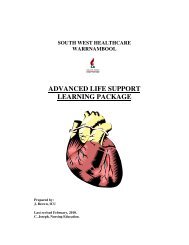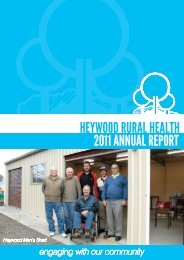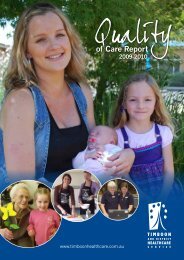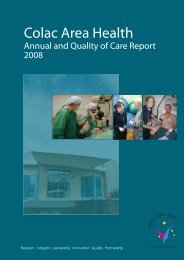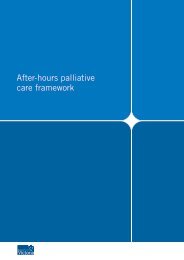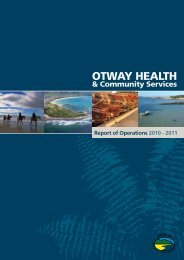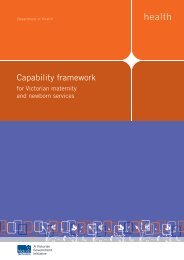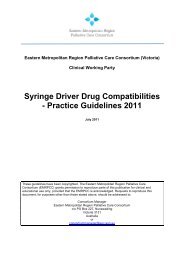Self Directed Learning Package - University of Queensland
Self Directed Learning Package - University of Queensland
Self Directed Learning Package - University of Queensland
- No tags were found...
You also want an ePaper? Increase the reach of your titles
YUMPU automatically turns print PDFs into web optimized ePapers that Google loves.
141 • <strong>Self</strong> <strong>Directed</strong> <strong>Learning</strong> <strong>Package</strong> - CareworkerNutrition andhydrationOne <strong>of</strong> the big worries that Alfred’s daughter, Sarah, had at thepalliative care case conference was that Alfred might starve todeath if he is unable to eat and drink. Remember that Sarah’smother was fed through a gastrostomy tube after she hada stroke. This continued for three weeks before she died <strong>of</strong>pneumonia.SeeRecognise and assessAlfred is drowsy and needs prompting to accept a drink from acup and straw.He only eats a few mouthfuls <strong>of</strong> food and sometimes coughswhen he swallows. Alfred is dying and this is causing his eatingand drinking problems. This is <strong>of</strong>ten a difficult and emotionaltime for families and can sometimes be hard for staff to manage.Key PointAt the end <strong>of</strong> life the body is beginning to shutdown because <strong>of</strong> the dying process, not because <strong>of</strong>the absence <strong>of</strong> food and fluids.Family members <strong>of</strong>ten find it difficult to distinguishbetween ‘not eating as part <strong>of</strong> the dying process’and ‘not eating as bringing about the dyingprocess’.Helping families understandThe PA toolkit contains a brochure “Understanding the DyingProcess” which can be given to family members when theresident is in the palliative or terminal phase.Table 3 provides a brief segment from the “Understandingthe Dying Process” brochure. This brochure is included inthe PA Toolkit and we recommend you familiarise yourselfwith the document.Table 3Segment from “Understanding the Dying Process” brochureMost people lose their appetite in the last few weeks <strong>of</strong> life.This is a very natural and normal part <strong>of</strong> the dying processbecause metabolism is slowing down and the body requiresless nutrition.At this time your instincts may be to try and feed the personin order to keep up their strength. The giving <strong>of</strong> food is <strong>of</strong>tensymbolic <strong>of</strong> loving and nurturing and to deprive someone <strong>of</strong>this may feel like neglect. However, as the person becomesincreasingly weak and drowsy, swallowing and digesting food andfluids <strong>of</strong>ten becomes harder and can place strain upon the body.Whilst the person may have a reduced oral intake, it is importantto maintain good oral care. Regular moistening <strong>of</strong> the mouthand lips will add to the person’s comfort.SayReport your assessmentAs a careworker you play a critical role in reportingresident’s symptoms to the nurse.Thinking PointConsider the following scenario:Alfred cannot feed himself now. When you help t<strong>of</strong>eed him, you notice he falls asleep whilst chewingand sometimes coughs.How would you report this to the nurse?



